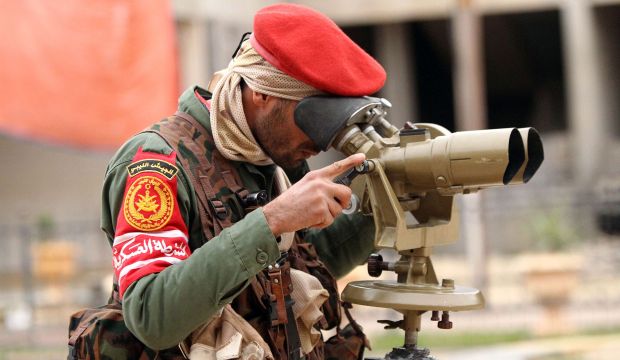
A member of the Libyan military police looks through binoculars as they fight alongside troops loyal to Khalifa Haftar, in clashes with Islamist gunmen in the eastern Libyan city of Benghazi, on December 16, 2014. (AFP Photo/Abdullah Doma)
Cairo, Asharq Al-Awsat—Libya’s internationally recognized parliament is set to promote the leader of the Libyan National Army group, Khalifa Haftar, to the rank of full general within the next few days, making him the highest-ranking army officer in the North African country, Asharq Al-Awsat has learned.
“As of now we will request from all media outlets to use the term ‘general’ to refer to Haftar in the news,” a member of Libya’s Western-backed cabinet headed by PM Abdullah Al-Thani, speaking on the condition of anonymity, told Asharq Al-Awsat.
Earlier this week, Asharq Al-Awsat quoted an unidentified senior Libyan official as saying that the Tobruk-based parliament intended to appoint Haftar as the country’s military commander-in-chief. The minister refused to give further details, saying briefly: “Later, Haftar will be appointed to a senior military position.”
Haftar has emerged as a significant power in war-torn Libya since he launched a military campaign, dubbed “Operation Dignity,” against Islamist militias in the eastern city of Benghazi in May.
The military leader was formerly a senior officer in the Libyan Army under late dictator Muammar Gaddafi. He returned from exile in the US in 2011 to take up a senior rank in the fragmented revolutionary forces that overthrew Gaddafi with the assistance of NATO and Arab air power.
As the country descended into chaos, Haftar was accused of attempting a military coup by ordering the transitional government, the General National Congress (GNC), to dissolve when it attempted to extend its term in office in February. In May, his forces stormed the Libyan parliament in Tripoli, leading to violent clashes with pro-GNC militias.
Libya currently has two rival governments and parliaments, one based in Tobruk and recognized internationally, and a rival Islamist-backed body based in Tripoli composed of members of the former GNC.
Thani’s Tobruk government, which was expelled from Tripoli after the city and its airport were seized by Islamist-linked militias, recently endorsed Haftar and his anti-Islamist campaign as the Tobruk government continues to struggle against its rivals in Tripoli.
In other news, the former Libyan army’s chief-of-staff, Abdulsalam Al-Obaidi, has announced plans to form a joint operations room to oversee military operations across the country, while pledging to stay above the struggle between Tripoli and Tobruk.
Obaidi commands the elements of Libya’s official armed forces that declined to follow Haftar.
In a press conference he held in Tripoli, Obaidi said the unit will be headed by Gen. Mohammed Al-Ashtar and will include military forces affiliated with the Libyan General Staff, commanders from the Libya Shield militias and representatives of government departments.
Obaidi said the Libyan General Staff seeks to remain neutral in the conflict between the country’s rival power centers, and that its main task included securing citizens, borders, air and sea ports, and institutions vital to maintaining state authority.
The official said the General Staff has called on representatives of the country’s various armed groups to form negotiation teams and engage in dialogue with the GNC and the government headed by the Muslim Brotherhood-affiliated Omar Al-Hassi in an attempt to resolve outstanding political issues.
Also in Libya, the UN mission to the country said on Wednesday it received positive responses from Libya’s factions regarding its call to hold a second round of talks aimed at healing the rift between them.
The international body said it was holding a fresh round of talks this week, but stopped short of giving details about time and place.
On the ground, the Libyan military forces under the command of the government in Tobruk carried out three airstrikes on Islamist positions in the city of Gharyan, south of Tripoli, on Wednesday.
In late November, Libyan forces began an aerial campaign against Islamist-affiliated groups in Tripoli, Zuwarah and Zawiya, cities where the Islamist Libya Dawn militia has established a strong presence.

Trackbacks/Pingbacks